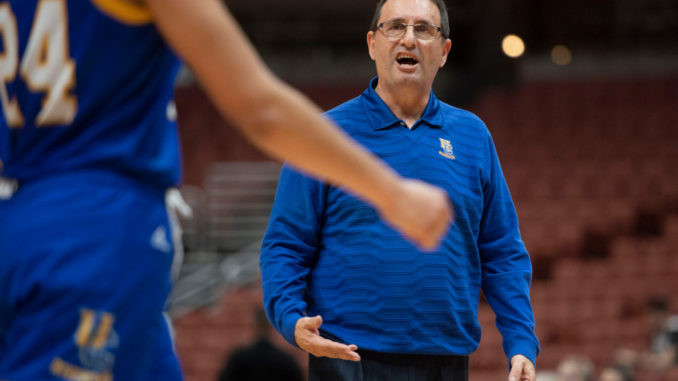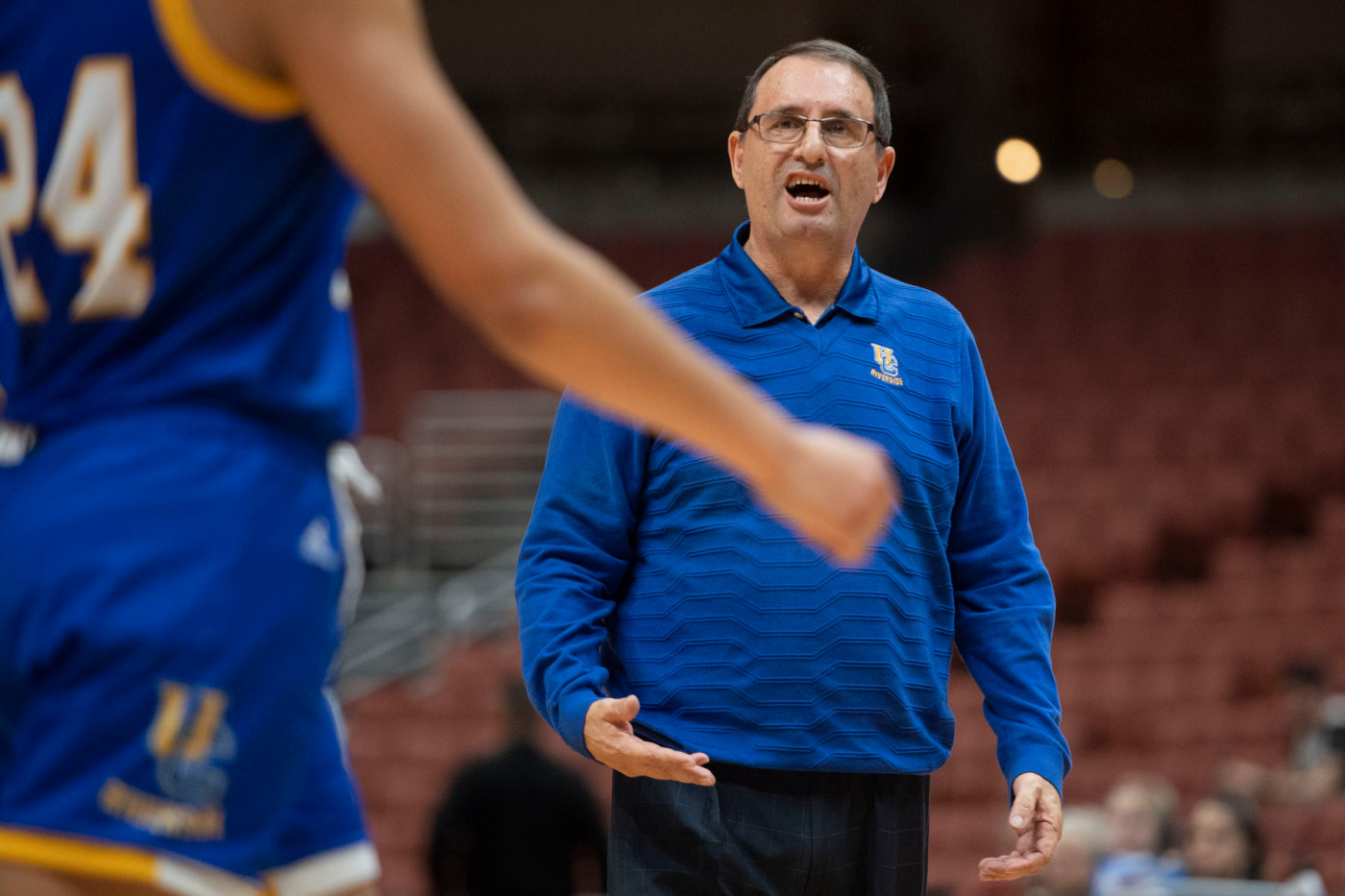
RIVERSIDE — The tipping point came when the assistant coach lost her job.
Giuliana Mendiola was an assistant coach in UC Riverside’s women’s basketball program for the past six seasons, during which time team members said she served as a buffer between coach John Margaritis and his players.
“Coach Giuliana was our advocate on the team,” said Inara Nyingifa, a player on the team from 2013 through 2016. “She spoke out when she saw stuff that was just wrong.
“He (Margaritis) does not like people who speak up.”
When Mendiola’s contract was not renewed for the 2019-20 season, former UCR players started speaking up about what they alleged to be Margaritis’ mistreatment of his players through the years, with a change.org petition, social media posts, a story in the school newspaper, The Highlander, and a willingness to speak about the subject to The Press-Enterprise.
The university put Margaritis on indefinite leave without pay Thursday in order to research the new allegations. Friday afternoon, Margaritis stepped down, effective immediately.
Seyram Bell, the only holdover assistant from last season’s staff and an assistant since the 2010-11 season, was named interim head coach, and athletic director Tamica Smith Jones said a search would begin for a permanent replacement.
Mendiola, asked Friday night if she would be interested in the job if it were offered to her, said in a text: “If that happens we can talk about it. No use discussing that as they currently have a head coach.”
Jones, in an email late Friday night, responded to a question about Mendiola by saying, “I hope Coach will apply if she is interested.”
Jones also elaborated on the process leading up to Margaritis’ resignation:
“Regarding the process that has (led) up to this and what I’ve heard from the current student-athletes, it’s important to know that when information is (brought to) our attention, it is escalated to the appropriate parties so it can be properly investigated. Once the results have been determined, appropriate disciplinary measures can be taken, if deemed necessary. That’s what happened in this matter and what I heard from the student-athletes was essentially that their experience wasn’t great in some instances and behaviors relative to their coach-player relationships needed to improve. It really came down to transformative leadership where coaches must use more appropriate ways to motivate student-athletes.”
Margaritis, reached by phone Friday night, indicated he was not in a position to comment at that point but would do so at a later date, but he did say: “Don’t fall victim to this stuff people are saying.”
Earlier in the summer, Margaritis was given a 20-day suspension earlier this summer for “violation of university policy.” At the time, there was no elaboration as to the nature of the violation or any clarity of when that suspension would begin, though it seemed to be a reaction to an investigation in which current players were interviewed. The team had recently returned from an exhibition tour of Greek Cyprus, and Margaritis, who is Greek, coached the team on the trip. Jones was also on the trip.
The dozen players who were contacted by The Press-Enterprise, spanning most of Margaritis’ 15 seasons at UCR, independently confirmed the coach’s pattern of behavior. They said Margaritis frequently threatened to take scholarships away, body-shamed and insulted them during practices and marathon film sessions, and used personal information against them to get into their heads. They described late-night calls from the coach to harangue them about their ability, or their weight, or their lifestyles.
They talked about the harshness with which Margaritis treated his assistant coaches; he has had 11 in the past decade, and only Bell has remained throughout that time. The former players described how he would berate athletic trainers and put pressure on injured athletes to get back on the court. They described his animus toward lesbian players.
“We players were good at hiding the abuse,” Dynese Adams, who played from 2012-13 to ’14-15, with time off to have a baby, wrote in an email response. “He preaches the idea of ‘mental toughness’ and uses that as leverage to ‘control’ us … Although (mental) toughness is a huge part of the game, it’s not a pawn to use against people to get them to do what you want.”
Several players mentioned an incident early in the 2012-13 season when Jessica Ogunnorin, then a sophomore forward, was pressured by Margaritis to return despite a series of concussions, beginning a downward spiral that eventually led her to attempt suicide. Ogunnorin survived and eventually transferred out of the program.
‘Just not necessary’
“The way he treated everybody, it wasn’t just us,” said Natasha Hadley, a center from Perris High who played at UCR from 2010-11 to 2013-14. “It was the trainers. It was everybody. The strength and conditioning coaches. He treated us all really poorly. It was just not necessary. Marvin Williams (her high school coach at Perris), he was tough on me, but I’m thankful I had him in my life. He wasn’t mean. He wasn’t cruel.”
“(Margaritis) would use people’s situations, get to know who they are, get to their weak point … get to know us and then try to get to us,” said Leah Washington, who was in the program from 2008 through 2013 and is an out lesbian.
“He would always call me at night and have these speeches about how I’m not fitting in image-wise, that there was a certain look for UCR that I was not fitting into and it wouldn’t be a good look for the press if I present myself the way I’m presenting myself. … He was really good making it one-on-one (conversations) and not having anyone else’s ears.
” … I felt everybody was against me because I’m gay. I felt he was telling them stuff. But a lot of us, we had no clue what was going on because he was dividing us.”
Margaritis is the most successful coach of UCR’s Division I era, taking his teams to three NCAA tournaments, three Women’s NITs and the Women’s Basketball Invitational. He has a 230-241 record in his 15 UCR seasons, including 133-107 in Big West play. That includes a 16-0 regular season in 2016, when the team finished its season with seven healthy players, but it also includes consecutive seasons of 13, 14 and 14 conference losses from 2012-14.
Former player Holly Peterson said Jones indicated she was aware of allegations of mistreatment by Margaritis as far back as 2015-16, the athletic director’s first academic year at UCR.
Now a high school principal at a charter school in Stockton and a published poet, Peterson said she met Jones for breakfast in the spring of 2016, after Peterson had performed a spoken word piece called “The Sisterhood of Sport” at an NFL Women’s Summit prior to Super Bowl 50 in Santa Clara.
When the athletic director mentioned donating money to the program, Peterson said, “I was just like, ‘I’m going to be candid. I don’t donate money to the program and will not as long as he is coaching there.’
“She was like, ‘Yeah, I know. I’ve already heard a lot about him and the way he treats people.’”
Peterson, who was a senior on Margaritis’ first UCR team in 2004-05, felt shunted aside as an out gay woman who was recruited by the previous coach, Jennifer Young. She is not alone in distancing herself, because few alumni have remained involved with the program.
“It’s a shame,” said Annelise Ito, who played from 2013-14 through 2015-16. “You can see that no one goes back to games. He ruined basketball for so many women, so many talented players who didn’t go overseas and have nothing left to show for it.”
‘OK, let them talk’
This past season, players on the current team made their own appeal to Jones.
“In December of this past year, it got to a point where he had belittled me and our team players at different times, but (it was) at this point where the players were fed up,” Mendiola said. ” … I have text messages from players saying they’ve had enough, they’re fed up with him, with his loser approach, his mentality, how he puts everyone down, and they’re tired of it.”
Mendiola added: “They met as a team, the players, a players-only meeting, and they’ve all come to this conclusion that they don’t want to play for him anymore.”
The captains met with her and told her how they felt, she said, and when she relayed their concerns to Margaritis, she said, “he just did not care. He was like, ‘OK, let them talk.’”
Mendiola urged the players to focus on basketball and let her try to change the approach. They responded that they wanted to take their concerns to the athletic director. Again, Mendiola informed Margaritis of the players’ mindset and again he acted unconcerned, she said.
“He goes, ‘I like making people feel uncomfortable,’” she said. “Coach Marg, he always said this. He likes putting people in difficult situations to test them, to make them uncomfortable. That was like his weird (thing), how he tried to make people accept how he treated people, which to me was a little odd.
“It’s almost like he took pleasure in it, which I find strange.”
Players did meet with Jones on Dec. 7 to express their concerns, and continued to play out the season.
On Thursday, Jones issued a written statement when Margaritis was placed on indefinite leave that included this: “Our priority is building a culture and environment where our student-athletes have a rewarding experience both on and off the court.”
Said Nyingifa earlier this week: “I think it goes back to checks and balances, as far as the athletic director, or even the coaches within an athletic program. If there’s nobody to check with each coach on what they’re doing or what they’re saying to student-athletes, they’re going to do whatever they want to do. … Student-athletes feel like they don’t have a voice, that there’s nothing they can do. They feel their only option is to submit and just persevere through it.”
Mind games
Few who played or worked for Margaritis were immune. Not even Brittany Crain – the Big West Player of the Year during the Highlanders’ 16-0 season in 2016 – was spared.
“He once told Brittany, when she was there the first year, ‘I should have let you go to Fullerton,’” said Akilah Martin, one of a triumvirate to go from North High’s program to UCR along with Crain and Simone DeCoud. “Brittany was the greatest player ever to go to UCR. She didn’t deserve that treatment. … I never really understood why he was always playing mind games, why he was always trying to mess with people. I kind of blew it off.”
Ito, then a senior, suffered a season-ending knee injury that required surgery in February 2016. She said the day she learned her college career was over, she sat in on the film session to support her teammates only to be humiliated when Margaritis kept showing the play that led to her injury, over and over.
“He got to my injury, which was on a fast break, and he replayed it seven times, saying, ‘I don’t know why you did this … you hurt yourself … this could have been avoided,’ basically blaming me for it,” Ito said. “I’m sitting there crying. I just found out my career was over on a team that was going to be 16-0. I didn’t know if I’d play basketball again. I was shocked. I didn’t even form words.”
That anecdote combined two of the biggest issues former players had toward Margaritis: film sessions and his attitude toward injuries.
The former, most of the players said, were opportunities to pick at players, often subtly – or not so subtly – jabbing them about things other than their play.
“He will talk about a player,” said Malou de Kergret, who played for UCR from 2016-17 through last season. “Instead of using her number, her jersey number, like anyone else, he’d go, ‘This fat little girl,’ or he’d talk about tattoos or whatever he would find, things about her body or appearance. It could be us or it could be about the other team.”
Michelle Curry, who played from 2014-15 to 2017-18 and was a second-team all-conference player as a senior, said: “Film, that was his time to belittle. He’d target our insecurities, mainly. He’d jab at them. He made some really rude comments … Every year he’d threaten my scholarship, saying, ‘You don’t deserve to be here. I don’t know why we signed you.’”
Ito said she believed Margaritis was so fixated on those film sessions that he neglected strength and conditioning sessions that would prevent injuries, while pressuring players to play through injuries.
“Before I blew my knee out, I was playing on a high ankle sprain,” Ito said. “He pressured me to play. He told me he was going to start me and he didn’t care if I could walk or not, I was gonna figure it out.”
Martin added: “He’d always cancel weights and things so we’d have more film, so our bodies were never his priority. You’d have to take care of that yourself.”
Nyingifa, reached by phone Friday night after the resignation was announced, said her impression was that Margaritis resigned to avoid being fired. She said she also believed Jones had been given an ultimatum herself, “that if she didn’t fire him, she would be fired. That’s why I feel that this isn’t a move because we care about students. It’s a move because the athletic director is trying to protect herself, and knows that without making this move she would have gotten fired.”
The bottom line, as the ex-players agreed and as Washington put it, was this:
“I’m 29 now. I can remember when I was 18. I had no clue. My mind was still not fully developed. I’m away from my parents. He’s a figure of authority. I’m listening to him. He must be right, so I’ve gotta do what he says or I’m not gonna have a scholarship.
“I didn’t know everything I know now. That’s why I’m speaking up, trying to help younger players. I couldn’t speak up in your position, so I’m going to speak for you now.”
Their speaking up helped effect change.
jalexander@scng.com
@Jim_Alexander on Twitter






